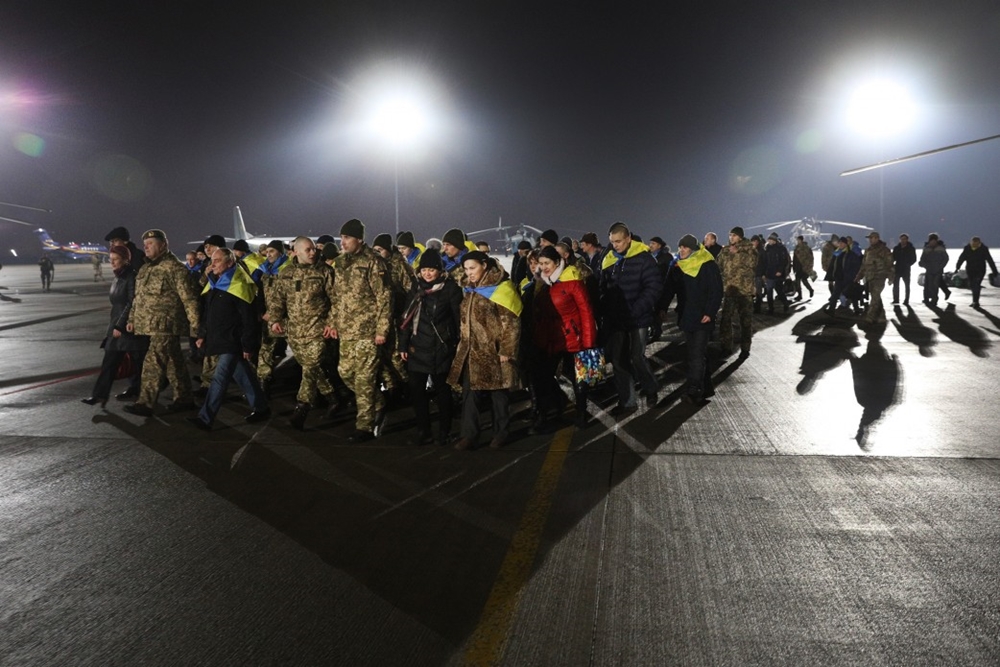RUSSIA MONITOR
Date: 4 January 2018
Putin’s Trick in Donbass
There is no doubt that the prisoner exchange between Ukraine and the so-called “people’s republics” can be considered as a humanitarian success. However, politically speaking, it is perceived as Kiev’s defeat. The entire process was initiated by Moscow and carried out under its conditions. In this way, Vladimir Putin has been implementing his Donbass “peace” scenario. This is the scenario aimed at achieving a strategic goal: to regain Kiev’s formal authority over currently occupied territories and, at the same time, to maintain Russia’s actual control in the aforementioned zones.

The exchange of prisoners on December 27 was the first one in fourteen months and, from the very beginning, it had been planned by the Kremlin. Such an operation has provided Putin with numerous benefits as it was profitable for him, Russian-backed rebels and the most important pro-Russian politician in Ukraine. In this way, Putin showed that he was a “peacemaker” and that he “had complied with the Ukrainian request”. In fact, it was Viktor Medvedchuk who asked the Russian President to call the leaders of the “people’s republics” in order to “persuade” them to take part in the talks on the prisoner exchange. The President of Russia has announced the possibility of the prisoner swap in the presence of Medvedchuk, Prime Minister Dmitry Medvedev and Patriarch Kirill of Moscow. In addition, the case has been publicised by the Russian media. Thanks to the presence of the primate of the Russian Orthodox Church, Russia aimed to show its humanitarian face. The Orthodox Church was used to legitimize the “people’s republics” and administration of the occupied territories that were allegedly presented as “independent” entitites (by the way, some bitting remarks have been made about the “competitive” Ukrainian Orthodox Church). Therefore, instead of being a party to the conflict, Putin appeared to be an effective intermediary. Moscow did not intentionally send any representative who would participate in the talks on the prisoner swap so Medvedchuk had to discuss the issue with the leaders of the “people’s republics”. This situation, similarly as repeating in the Russian media that Ukrainian citizens were exchanged for other Ukrainian citizens, strengthens one of the main themes of the Russian narrative about Donbass, according to which the country is in civil war.
Viktor Medvedchuk has played an interesting role there. Putin’s friend and chief of staff to Ukrainian president Leonid Kuchma, he was perceived as an effective intriguer. In addition, he has been representing Kiev in the prisoner swap between Ukraine and Russian-backed separatists. From the political point of view, it seems to be risky for the Ukrainian authorities since Medvedchuk is considered to be the leader of the Russian faction in Ukraine. One can wonder whether his participation in the prisoner swap may be the proof of his powerful influence. His request has launched the process (which was expected by Putin himself), and, at the same, it has set aside other politicians in Kiev. Medvedchuk can now claim that, since he has led to the release of prisoners, he has the chance to free over one hundred illegally detained Ukrainians. In this way, Medvedchuk has become part of the Russian “de-escalation” scenario, according to which Moscow is carefully building its “peace party” in Kiev; it is composed of people who advocate improving relations with Russia under Russian conditions. Their long-term goal is to regain at least some of the influence that the Russians had had in Ukraine before 2014.
The implementation of the Minsk agreements will be the most important mean to achieve this goal. It is not a coincidence that when the so-called Minsk contact group agreed on the prisoner exchange, Russia’s representative Boris Gryzlov announced that for 2018 Moscow has set such goals as a full amnesty and providing the occupied territories with a special status. Now, the Kremlin may officially declare that it has begun to fulfill the Minsk Protocol. The prisoner swap is included in one of its points. According to the Russians, Ukraine needs to make the next step. However, both sides are arguing about the order in which obligations should be implemented. Moscow demands elections and Donbass’ special status as first decisions to be introduced. Such a situation is extremely unfavorable for Kiev, though. It may even consolidate the Russian influence in Donbass; if the region is officially controlled by Kiev, such a state of matters will in fact lead to the federalization of Ukraine. One can now expect that the issue of introducing a UN peacekeeping mission in Donbass will be discussed again. However, it will be a trap if an effective control over the boundary of occupied territories is not simultaneously restored. Both Donetsk and Luhansk will be still governed by Moscow’s trusted people; nevertheless, the Kremlin will demand from Kiev to fulfill some decisions of the Minsk Protocol, saying that since there are some UN forces in Donbass, there are no more contradictions that would prevent the country from implementing the obligations. However, if it is the case, it will be impossible to restore the control over the border. First of all, the Russian influence in Donbass (and thus on the entire Ukrainian territory) will be consolidated. Secondly, the situation will be taken up by the West which seeks to de-escalate conflict, also by mitigating sanctions.
_________________________________
All texts published by the Warsaw Institute Foundation may be disseminated on the condition that their origin is credited. Images may not be used without permission.














